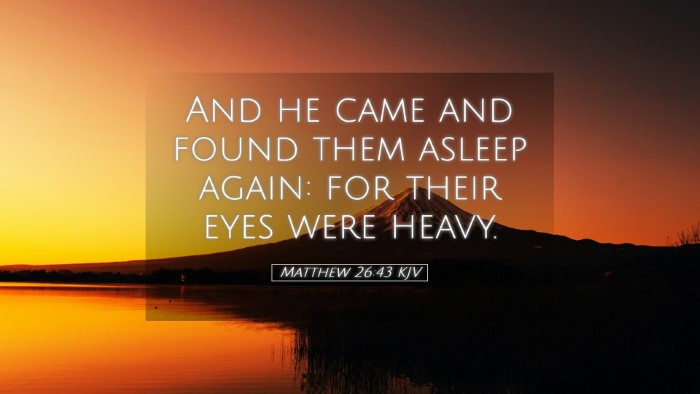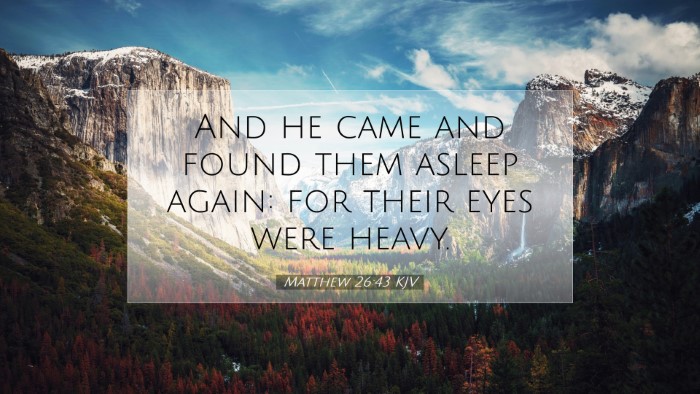Commentary on Matthew 26:43
Matthew 26:43 states: "And He came and found them asleep again: for their eyes were heavy."
Introduction
This verse occurs in the context of Jesus’ prayer in the Garden of Gethsemane, a pivotal moment prior to His crucifixion. It highlights the struggle of the disciples against the natural inclination to succumb to weariness and the spiritual significance of their failure to stay awake. Here, we draw insights from esteemed public domain commentaries.
Contextual Overview
The narrative presents a deeper theological reflection on human frailty and divine expectations. Jesus, aware of His impending suffering, seeks companionship and support from His disciples. Their inability to remain vigilant serves as a profound illustration of human limitations when confronted with spiritual demands.
Matthew Henry's Insights
According to Matthew Henry, this scene emphasizes the weight of spiritual responsibility. He notes that sleep in this context is emblematic of spiritual laziness and unpreparedness. The disciples were physically present, yet they failed to engage in prayer, highlighting the dichotomy between physical alertness and spiritual vigilance.
- Spiritual Unpreparedness: Henry underscores that the disciples' sleep signifies a lack of watchfulness. The exhortation from Jesus to "watch and pray" is a call to maintain spiritual alertness.
- Human Weakness: This moment illustrates the frailty of human nature. Henry comments on how fatigue can easily overtake our spirits, particularly during times of distress and the need for prayer.
- The Need for Support: Jesus’ expectations of His disciples highlight the importance of community in spiritual endeavors. Their failure to support Him underscores a broader message about the call for unity in prayerful vigilance.
Albert Barnes' Commentary
Albert Barnes provides a diligent examination of the text, focusing on the implications of Jesus discovering His disciples asleep. He notes that this repeated failure can be understood as a profound neglect of duty to support their master in a time of need.
- Repeated Failures: Barnes emphasizes the repetition in the narrative, noting that this is the second time Jesus found them asleep, indicating a persistent lack of awareness and commitment.
- Symbol of Spiritual Complacency: He reflects on how sleep may represent a broader spiritual complacency that remains pervasive within the church, a warning against the dangers of neglecting spiritual responsibilities.
- Call to Watchfulness: In light of this failure, Barnes encourages believers to remain vigilant, as spiritual awakeness is crucial to withstand trials and temptations.
Adam Clarke's Analysis
Adam Clarke approaches the verse with a notable examination of its theological implications, emphasizing the disciples’ weariness as a physical manifestation of their internal struggles.
- Physical vs. Spiritual Struggle: Clarke points out the tension between physical fatigue and the necessity of spiritual engagement. He considers their sleeplessness not just a physical state but reflective of the spiritual battle they were not prepared to face.
- Significance of the Garden: Clarke notes the Garden of Gethsemane as a symbolic place of both human weakness and divine confrontation. The disciples’ inability to stay awake underscores humanity's struggle against the demands of righteousness.
- Exhortation for Believers: Clarke links this moment to a broader exhortation for believers to watch and pray lest they also fall into temptation, echoing the teachings of vigilance throughout scripture.
Theological Reflections
Matthew 26:43 not only reflects on the immediate context of the passion narrative but invites deeper theological engagement. The failure of the disciples serves as a poignant reminder for contemporary readers about the necessity of watchfulness in times of trial.
- Human Weakness and Divine Grace: The verse illustrates the interplay between human frailty and the need for divine assistance. Our weaknesses highlight our need for Christ's grace and strength.
- The Importance of Prayer: The disciples’ failure to pray correlates with their spiritual downfall. This underscores the essential nature of prayer in sustaining our spiritual lives and preparing us for trials.
- Community and Accountability: This moment reinforces the belief in the collective responsibility of believers to uphold one another in prayer and vigilance, reflecting the necessity for accountability within the Christian community.
Conclusion
Matthew 26:43 serves as a focal point for understanding the dynamics of spiritual vigilance and human frailty. Through the lenses of Henry, Barnes, and Clarke, we gain comprehensive insights that enrich our study and application of scripture.
Pastors, students, and theologians are encouraged to reflect on these commentaries, allowing them to deepen their understanding of the necessity of prayer, community support, and the ever-present call to spiritual alertness amidst life's trials.


